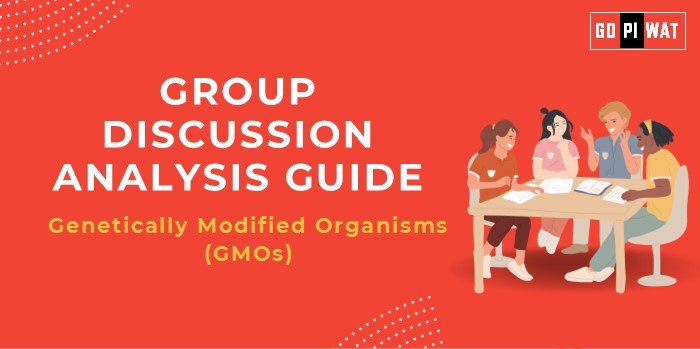📋 Group Discussion (GD) Analysis Guide: Should Governments Legalize Genetically Modified Organisms (GMOs)?
🌐 Introduction to the Topic
Opening Context:
Genetically Modified Organisms (GMOs) are at the center of debates on sustainability, food security, and ethical science. While proponents argue for their potential to solve hunger crises, critics raise ethical and ecological concerns.
Topic Background:
The concept of GMOs emerged in the 1970s with advances in genetic engineering. Today, they account for a significant portion of global agricultural output, particularly in crops like soy, corn, and cotton. The ethical debate revolves around human intervention in natural genetic makeup, health implications, and corporate control over food systems.
📊 Quick Facts and Key Statistics
- 🌍 Global GMO Production: Over 190 million hectares of GMO crops grown worldwide (2022).
- 🍽️ Hunger Statistics: ~828 million people face hunger globally, highlighting a potential need for GMOs to enhance food security.
- 💰 Economic Impact: GMO crops contribute $150 billion annually to the global economy.
- ⚖️ Regulations: Only 26 countries grow GMOs, while over 60 countries have strict GMO labeling laws.
🧩 Stakeholders and Their Roles
- 🏛️ Governments: Regulate GMO usage, ensure public safety, and balance food security needs.
- 🔬 Biotech Companies: Innovate and commercialize GMO crops; often criticized for monopolistic practices.
- 👩🌾 Farmers: Use GMOs to increase yield but face ethical dilemmas and dependency on patented seeds.
- 🍴 Consumers: Demand transparency about food safety and ethical production.
- 🌱 Environmentalists and NGOs: Advocate against GMOs, citing ecological and health risks.
🏆 Achievements and Challenges
✨ Achievements:
- 📈 Increased Yield: GMO crops have improved productivity by 22%.
- 🐛 Pest Resistance: Reduced pesticide use by 37% globally, contributing to environmental sustainability.
- 🌾 Food Security: Enabled production in drought-prone or nutrient-poor soils.
⚠️ Challenges:
- 🧪 Health Concerns: Long-term effects of GMOs on human health remain under-researched.
- 🌍 Biodiversity Loss: Potential risks of crossbreeding with wild species.
- ⚖️ Ethical Concerns: Patenting life forms and farmer dependency on large corporations.
🌎 Global Comparisons:
- 🇺🇸 Success: The U.S. leads in GMO adoption for major crops with substantial productivity gains.
- 🇪🇺 Resistance: The EU has stringent restrictions on GMOs due to public health concerns.
Case Study: India’s introduction of Bt cotton increased yield by 24% but led to debates about farmer suicides.
💬 Structured Arguments for Discussion
- Supporting Stance: “GMOs are vital for combating global hunger and ensuring food security in a world with a growing population.”
- Opposing Stance: “The ethical and ecological risks of GMOs outweigh their benefits, questioning humanity’s right to tamper with nature.”
- Balanced Perspective: “While GMOs address key agricultural challenges, ethical frameworks and regulatory safeguards are essential for their responsible use.”
📚 Effective Discussion Approaches
Opening Techniques:
- 📊 Statistical Impact: “With 828 million people facing hunger globally, can GMOs be the answer to food insecurity?”
- ⚖️ Contrast: “While GMOs offer solutions to food shortages, their long-term health and ecological impacts are contentious.”
- 📜 Case Study: “The Bt cotton experience in India highlights both the potential and pitfalls of GMOs in agriculture.”
Counter-Argument Handling:
- 🛡️ Use evidence such as health studies, ecological case studies, and global regulatory frameworks to address critiques effectively.
📈 Strategic Analysis of Strengths and Weaknesses
- ✔️ Strengths: Increased food production, resilience to climate change, and reduced pesticide use.
- ❌ Weaknesses: Ethical concerns, corporate monopolies, and biodiversity threats.
- 💡 Opportunities: Biotech advancements, sustainable farming practices.
- ⚠️ Threats: Public opposition, environmental risks.
🏫 Connecting with B-School Applications
Real-World Applications:
- 🌟 Topics for sustainability projects or ethical business models in agriculture.
Sample Interview Questions:
- ❓ “How do GMOs balance innovation with ethical considerations?”
- ❓ “What role can B-schools play in shaping sustainable GMO policies?”
Insights:
- 📦 Explore GMOs’ impact on food supply chains and ethical entrepreneurship.


